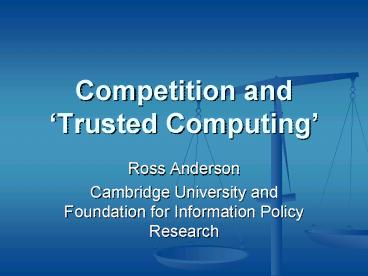Competition and Trusted Computing PowerPoint PPT Presentation
Title: Competition and Trusted Computing
1
Competition and Trusted Computing
- Ross Anderson
- Cambridge University and Foundation for
Information Policy Research
2
Economics and Security
- Over the last four years, weve started to apply
economic analysis to information security - Economic analysis often explains security failure
better! Bank customers suffer when bank systems
allow fraud, patients suffer when hospital
systems break privacy - People who can protect a system are not the
people who suffer when its hacked - And information security mechanisms are used
increasingly to support business models rather
than manage risk
3
New Uses of Infosec
- Xerox started using authentication in ink
cartridges to tie them to the printer. Followed
by HP, Lexmark and others - Motorola started authenticating batteries to
mobile phones - BMW now has a prototype car that authenticates
its major components - Increasingly crypto is used to lock customers in,
tie products, bundle services, enforce
cross-subsidies and rig markets generally - Now Trusted Computing will deepen this
4
Whats Software Worth?
- The value of a software company is the total
switching costs of all its customers - E.g., law firm with 100 fee earners paying 500 a
seat for Office -gt it would cost 50K to retrain
everyone to use OpenOffice, convert files etc - In software, lock-in plays the role that patents
do in the drug industry - Same holds for many other online services
5
Rights Management and Competition
- IRM Information Rights Management changes
ownership of a file from the machine owner to the
file creator - Files are encrypted and associated with rights
management information - The file creator can specify that a file can only
be read by Mr. X, and only till date Y - Now shipping in Office 2003
- What will be the effect on the typical business
that uses PCs?
6
TC (Trusted / Trustworthy / Treacherous Computing)
- Trusted Computing Group (TCG) redsigning PCs to
give better support to DRM, to the IRM mechanisms
in Office 2003, to online software registration
etc - Idea put a TPM (smartcard) chip in every PC
motherboard, PDA, mobile phone - This will do remote attestation of what the
machine is and what software its running - On top of this will be layers of software
providing new security functionality, of a kind
that would otherwise be easily circumvented
7
Why is Microsoft so Keen?
- At present, a company with 100 PCs pays maybe
500 per seat for Office - Remember value of software company total
switching costs - So cost of retraining everyone to use Linux,
converting files etc is maybe 50,000 - But once many of the documents cant be converted
without the creators permission, the switching
cost is much higher - Bill we came to this thinking about music but
then realised documents and email were much more
interesting
8
Strategic Issues
- Who will control users data?
- Microsoft view everything will be on an MS
platform (your WP files, presentations, address
book, pictures, movies, music) - European Commission view this is illegal
anticompetitive behaviour - Anti-trust judgment orders MS to unbundle Media
Player - Also, German government view on competition
policy requirements on TCG
9
Competitive Issues
- For years, Microsofts vision has been to control
a framework into which all user data is drawn,
and in which it is then managed - TC could extend Microsofts market power from the
PC to PDAs, phones, music systems, - If this works it is bad news for free markets,
and for vendors of phones / consumer electronics - Even if not, TC could have all sorts of effects
on software and online industries
10
Competitive Issues (2)
- At present, there are many petabytes of free
data for new apps to use (I.e., your data) - In future, apps can use TC mechanisms to lock in
users by locking down their data - Successful app vendors can rent out access to
your data on your own PC to other apps - Software startups will have lower probability of
success, though the winners will win bigger - The software industry will become much less
dynamic, more like a normal industry - at a
cost in growth and jobs (especially in LDCs)
11
Competitive Issues (3)
- Playstation model - subsidize hardware from later
software sales - 2007 - a PC costs 399 in Walmart, a TC 299
- 2009 - you buy an Office Plan for 29.95 a month
including unlimited Word and Excel with 500
anytime Powerpoint minutes per month. The
hardware comes free - What will the effect on free software?
- Whats the effect on the Internal Market? Firms
will want and be able to price discriminate - And the pervasive computing future???
12
Conclusion
- TC has nasty effects on competition policy (see
my website for more detail) - Its a cynical way of twisting the TRIPs
anti-circumvention prohibitions into a
general-purpose anti-competitive tool - But enough firms will get hurt that we can surely
build momentum against it - A digital rights directive must buttress not just
consumer freedoms but also market freedoms - Its not just about music - its about everything
contain software! That is, just about everything

